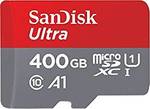This is definately overkill for a lot of people but it's a great price for this card for those that are looking for the high capacity, JB Hifi have these retailing at $449, cheapest on eBay is about $400. If buying through Amazon US, it's currently around $350 AUD.
Conversion in the post is if you use Amazon's AUD converter. You can always select to be charged in EUR to use your bank's converter which might reduce the cost by a few more dollars (please check your bank's exchange rates though).
Item ID SDSQUAR-400G-GN6MA
The SanDisk Ultra microSDXC UHS-I 400GB card gives you the freedom to shoot, save and share more than ever. Our higher capacity microSD card is perfect for recording and watching Full HD videos, with storage space for even more hours of video. Transfer speeds of up to 100 MB / s guarantee that you can move all your content surprisingly fast: up to 1200 photographs in just one minute. Ideal for smartphones and tablets with Android operating system, the A1 class of this card means you can also load your applications faster.
Lowest price it has been according to CamelCamelCamel

 CamelCamelCamel
CamelCamelCamel
Wow.